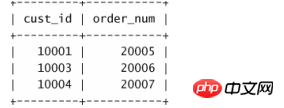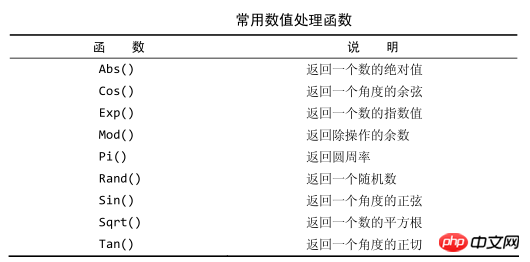 Database
Database
 Mysql Tutorial
Mysql Tutorial
 Date and time processing functions and numerical processing function examples (Usage of data processing functions 2)
Date and time processing functions and numerical processing function examples (Usage of data processing functions 2)
Date and time processing functions and numerical processing function examples (Usage of data processing functions 2)
Date and time processing functions
Date and time are stored in corresponding data types and special formats so that they can be sorted or filtered quickly and effectively, and save physical storage space .
Generally, applications do not use a format for storing dates and times, so date and time functions are always used to read and process these values. For this reason, date and time functions play an important role in the MySQL language.
The following table lists some commonly used date and time processing functions:

This is a good time to review where to filter data. So far, we have filtered data using where clauses that compare numbers and text, but data often needs to be filtered by date. Filtering by date requires some additional considerations and the use of special MySQL functions.
The first thing to note is the date format used by MySQL. Whenever you specify a date, whether inserting or updating a table value or filtering with a where clause, the date must be in the format yyyy-mm-dd. Therefore, September 1, 2005, is given as 2005-09-01. Although other date formats may work, this is the preferred date format because it excludes ambiguity (e.g., 04/05/06 is May 4, 2006 or April 5, 2006 or May 6, 2004 or...).
You should always use 4-digit years. 2-digit years are supported. MySQL handles 00-69 as 2000-2069 and 70-99 as 1970-1999. Although they may be intended years, using full 4-digit years is more reliable because MySQL does not have to make any assumptions.
So a basic date comparison should be simple:
Input:
select cust_id,order_num from orders where order_date = '2005-09-01';
Output:

Analysis: This select statement runs normally. It retrieves an order record whose order_date is 2005-09-01.
But, is using where order_date = '2005-09-01' reliable? The data type of order_date is datetime. This type stores date and time values. The values in the sample table all have a time value of 00:00:00, but in practice this is likely not always the case. What if I store the order date with the current date and time? For example, if the stored order_date value is 2005-09-01 11:30:05, then where order_date = '2005-09-01' fails. Even if given a row with that date, it won't be retrieved because the where match fails.
The solution is to instruct MySQL to compare the given date only to the date part in the column, rather than comparing the given date to the entire column value. For this purpose, the date() function must be used. Date(order_date) instructs MySQL to extract only the date part of the column. A more reliable select statement is:
Input:
select cust_id,order_num from orders where Date(order_date) = '2005-09-01';
If all you want is the date, then using Date() is A good practice, even if you know that the corresponding column only contains dates. This way, if for some reason there are date and time values in the table later, your SQL code doesn't have to change. Of course, there is also a Time() function, which should be used when you just want the time.
Date() and Time() were first introduced in MySQL4.1.1.
After you know how to test for equality with dates, the use of other operators will be clear.
However, there is another kind of date comparison that needs to be explained. What if you want to retrieve all orders placed in September 2005? A simple equality test won't work because it also has to match the number of days in the month. There are several solutions, one of which looks like this:
Input:
select cust_id,order_num from orders where Date(order_date) between '2005-09-01' and '2005-09-30';
Output:

Analysis: where, between The operator is used to define 2005-09-01 and 2005-09-30 as a date range to be matched.
Numerical processing function
Numeric processing function only processes numerical data. These functions are generally used primarily for algebraic, trigonometric, or geometric operations, and therefore are not used as frequently as string or date-time processing functions.
Ironically, among the functions of the major DBMS, numeric functions are the most consistent and uniform functions. The following table lists some commonly used numerical processing functions:

The above is the detailed content of Date and time processing functions and numerical processing function examples (Usage of data processing functions 2). For more information, please follow other related articles on the PHP Chinese website!

Hot AI Tools

Undresser.AI Undress
AI-powered app for creating realistic nude photos

AI Clothes Remover
Online AI tool for removing clothes from photos.

Undress AI Tool
Undress images for free

Clothoff.io
AI clothes remover

Video Face Swap
Swap faces in any video effortlessly with our completely free AI face swap tool!

Hot Article

Hot Tools

Notepad++7.3.1
Easy-to-use and free code editor

SublimeText3 Chinese version
Chinese version, very easy to use

Zend Studio 13.0.1
Powerful PHP integrated development environment

Dreamweaver CS6
Visual web development tools

SublimeText3 Mac version
God-level code editing software (SublimeText3)

Hot Topics
 When might a full table scan be faster than using an index in MySQL?
Apr 09, 2025 am 12:05 AM
When might a full table scan be faster than using an index in MySQL?
Apr 09, 2025 am 12:05 AM
Full table scanning may be faster in MySQL than using indexes. Specific cases include: 1) the data volume is small; 2) when the query returns a large amount of data; 3) when the index column is not highly selective; 4) when the complex query. By analyzing query plans, optimizing indexes, avoiding over-index and regularly maintaining tables, you can make the best choices in practical applications.
 Can I install mysql on Windows 7
Apr 08, 2025 pm 03:21 PM
Can I install mysql on Windows 7
Apr 08, 2025 pm 03:21 PM
Yes, MySQL can be installed on Windows 7, and although Microsoft has stopped supporting Windows 7, MySQL is still compatible with it. However, the following points should be noted during the installation process: Download the MySQL installer for Windows. Select the appropriate version of MySQL (community or enterprise). Select the appropriate installation directory and character set during the installation process. Set the root user password and keep it properly. Connect to the database for testing. Note the compatibility and security issues on Windows 7, and it is recommended to upgrade to a supported operating system.
 MySQL: Simple Concepts for Easy Learning
Apr 10, 2025 am 09:29 AM
MySQL: Simple Concepts for Easy Learning
Apr 10, 2025 am 09:29 AM
MySQL is an open source relational database management system. 1) Create database and tables: Use the CREATEDATABASE and CREATETABLE commands. 2) Basic operations: INSERT, UPDATE, DELETE and SELECT. 3) Advanced operations: JOIN, subquery and transaction processing. 4) Debugging skills: Check syntax, data type and permissions. 5) Optimization suggestions: Use indexes, avoid SELECT* and use transactions.
 Can mysql and mariadb coexist
Apr 08, 2025 pm 02:27 PM
Can mysql and mariadb coexist
Apr 08, 2025 pm 02:27 PM
MySQL and MariaDB can coexist, but need to be configured with caution. The key is to allocate different port numbers and data directories to each database, and adjust parameters such as memory allocation and cache size. Connection pooling, application configuration, and version differences also need to be considered and need to be carefully tested and planned to avoid pitfalls. Running two databases simultaneously can cause performance problems in situations where resources are limited.
 The relationship between mysql user and database
Apr 08, 2025 pm 07:15 PM
The relationship between mysql user and database
Apr 08, 2025 pm 07:15 PM
In MySQL database, the relationship between the user and the database is defined by permissions and tables. The user has a username and password to access the database. Permissions are granted through the GRANT command, while the table is created by the CREATE TABLE command. To establish a relationship between a user and a database, you need to create a database, create a user, and then grant permissions.
 RDS MySQL integration with Redshift zero ETL
Apr 08, 2025 pm 07:06 PM
RDS MySQL integration with Redshift zero ETL
Apr 08, 2025 pm 07:06 PM
Data Integration Simplification: AmazonRDSMySQL and Redshift's zero ETL integration Efficient data integration is at the heart of a data-driven organization. Traditional ETL (extract, convert, load) processes are complex and time-consuming, especially when integrating databases (such as AmazonRDSMySQL) with data warehouses (such as Redshift). However, AWS provides zero ETL integration solutions that have completely changed this situation, providing a simplified, near-real-time solution for data migration from RDSMySQL to Redshift. This article will dive into RDSMySQL zero ETL integration with Redshift, explaining how it works and the advantages it brings to data engineers and developers.
 Laravel Eloquent ORM in Bangla partial model search)
Apr 08, 2025 pm 02:06 PM
Laravel Eloquent ORM in Bangla partial model search)
Apr 08, 2025 pm 02:06 PM
LaravelEloquent Model Retrieval: Easily obtaining database data EloquentORM provides a concise and easy-to-understand way to operate the database. This article will introduce various Eloquent model search techniques in detail to help you obtain data from the database efficiently. 1. Get all records. Use the all() method to get all records in the database table: useApp\Models\Post;$posts=Post::all(); This will return a collection. You can access data using foreach loop or other collection methods: foreach($postsas$post){echo$post->
 MySQL: The Ease of Data Management for Beginners
Apr 09, 2025 am 12:07 AM
MySQL: The Ease of Data Management for Beginners
Apr 09, 2025 am 12:07 AM
MySQL is suitable for beginners because it is simple to install, powerful and easy to manage data. 1. Simple installation and configuration, suitable for a variety of operating systems. 2. Support basic operations such as creating databases and tables, inserting, querying, updating and deleting data. 3. Provide advanced functions such as JOIN operations and subqueries. 4. Performance can be improved through indexing, query optimization and table partitioning. 5. Support backup, recovery and security measures to ensure data security and consistency.





